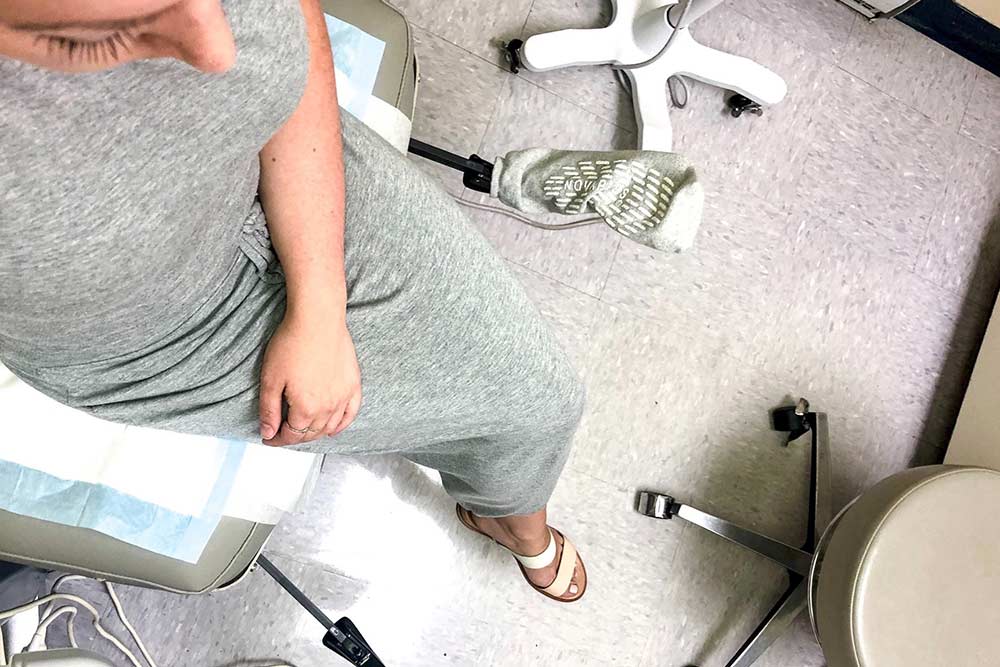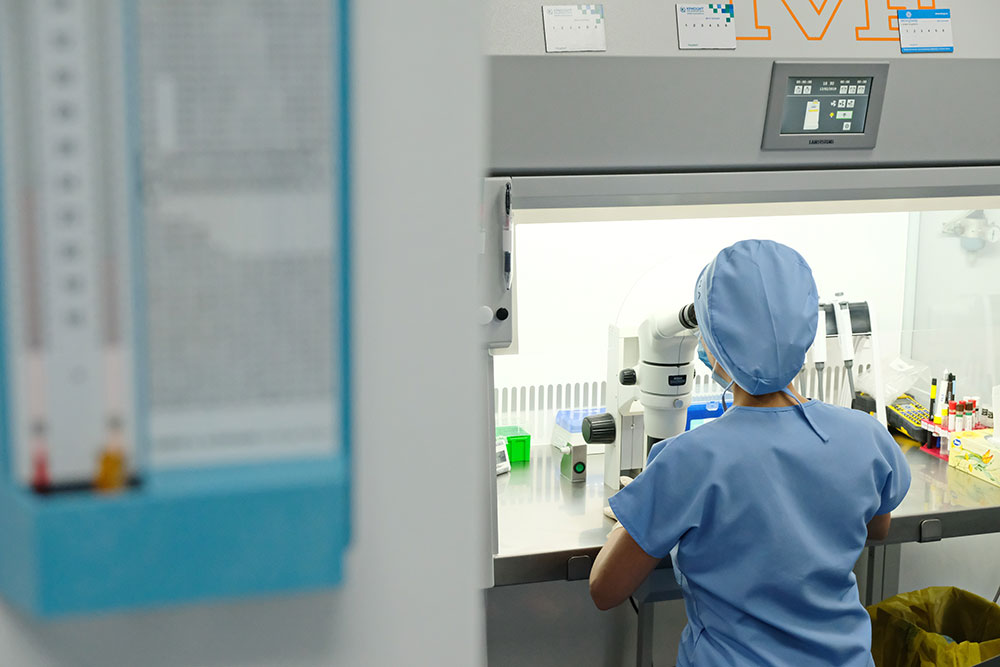The IVF Journey | Part Two: Pre-Treatment Screenings and Preparations

A deeper look at the groundwork before the procedure, plus advice for patients on finding the support they need.
Expert Sources: Lauren Berson; Banafsheh Kashani, MD, FACOG; Jordan Rush, MD, OB-GYN
This article is the second part of our IVF series. Read part one here.
In vitro fertilization (IVF) is a type of assisted reproductive technology (ART) that involves using a combination of reproductive medicines and surgical procedures to help sperm fertilize an egg outside of the uterus; “in vitro” means outside the body. After fertilization, embryos are then placed directly into a patient’s uterus for possible conception.
IVF is most commonly recommended for people with nonfunctional or missing fallopian tubes and partners with poor sperm quality. But other circumstances can lead to someone choosing assisted reproduction, including age, health issues (such as endometriosis), unexplained infertility, and as a way for same-sex couples to experience pregnancy and parenthood.
Before IVF treatment begins, patients will typically undergo a basic infertility evaluation that involves a series of tests, screenings, and conversations with their provider. For a better understanding of what to expect prior to the first treatment, we connected with fertility specialists Banafsheh Kashani, MD, FACOG, reproductive endocrinology and infertility specialist in Orange County, California, and Jordan Rush, MD, an OB-GYN at Northside Women’s Specialists in Atlanta, Georgia and fellow with the National Institutes of Health, Endocrinology Diabetes & Metabolism on the next steps of the IVF journey.
Screenings and Tests
In vitro fertilization is an involved process even before the actual first step of treatment (ovarian stimulation) occurs. From evaluating egg quantity to analyzing semen to testing for infectious diseases, there’s no shortage of prep that comes with getting ready for IVF to begin, but according to the experts, the payoff is beneficial.
“Pre-screening assessments are done to ensure that patients undergoing fertility treatments can receive the most optimized treatment protocol specific to their diagnosis. It is recommended that all these preimplantation assessments be completed before starting treatment,” says Dr. Kashani. “For example, if a partner has not yet completed a semen analysis, it would not be advisable to start treatments without this information, in the event that the sperm counts are too low to qualify for an intrauterine insemination.”
A patient’s reproductive endocrinologist (REI), also called a fertility specialist, performs the comprehensive evaluation and helps guide decisions on which tests are appropriate. While these deciding factors are unique to every patient, these are the common pre-screenings and tests to anticipate:
Semen analysis
A semen analysis is often the first step in IVF screening because it is non-invasive and can tell providers a great deal about the quality, activity (motility), and volume of a partner or donor’s sperm. One reason for conception issues is semen abnormality, and this analysis helps determine the likelihood that the sperm can cause a pregnancy.
Ovarian reserve testing
Ovarian reserve testing uses a combination of blood tests and a vaginal ultrasound to determine the number of eggs (follicles) that remain in a patient’s ovaries, as egg count is a strong predictor of fertility treatment success. This testing can also rule out potential hormonal imbalances that can impact the patient’s menstrual cycle.
Infectious disease screening
Just as pregnant people are advised to test for certain diseases before birth, the same recommendations apply to patients and their partners going through fertility treatment.
“Tests for HIV, syphilis, hepatitis A and B, gonorrhea, and chlamydia are performed on the patient and their partner or sperm donor, as well as an egg donor or surrogate, if applicable,” says Dr. Rush.
Certain diseases like chlamydia and gonorrhea can cause pelvic infection and tubal damage and must be treated with antibiotics before patients and their partners can begin treatment.

Uterine exam
During this exam, a provider will examine the inside lining of a patient’s uterus to check if it’s healthy. This exam may involve a sonohysterography (where fluid is injected through the cervix into the uterus) and an ultrasound to analyze images of the uterine cavity. Another option (though more invasive) is performing a hysteroscopy, in which a thin, lighted telescope is inserted into the uterus and used to examine the uterine walls.
Pelvic ultrasound
If not done previously, Dr. Rush notes that a pelvic ultrasound is also performed during this time.
“A pelvic ultrasound to evaluate uterine anatomy is also necessary prior to embryo transfer to make sure the uterine cavity is normal and there are no uterine anomalies, fibroids, or polyps that may affect embryo transfer.”
Practice (mock) embryo transfer
Dr. Kashani explains that there are two scenarios that people refer to as a “mock embryo transfer.” These trial transfers are used to ensure patients and providers optimize efficiency on the day of the actual embryo transfer.
“One [scenario] is the process of going through an attempted embryo transfer procedure where a catheter is advanced into the cervix (the narrow tunnel or passageway into the uterus). This is to ‘map’ the pathway into the uterus to see if it is a ‘straight path’ or if there are any twists and turns that can make it more challenging to perform the embryo transfer. The embryo transfer day is such a big day that it is best to be prepared and have a trial run.
“Alternatively, people reference ‘mock embryo transfer cycles.’ This is when you take hormones that would be used for an embryo transfer cycle, and then test the uterine receptivity to ensure that the protocol of hormones used is appropriate and does not need to be adjusted. This is to help achieve a more personalized embryo transfer and optimize success rates.”
Note that a less than “straight” uterus, such as a tilted or retroverted uterus, does not affect a patient’s chance of successful implantation or pregnancy, though it is helpful for doctors to know what to expect before handing the precious cargo of an embryo.
Dr. Rush adds that the mock procedure also allows the physician to evaluate the best size catheter to use in advance, as well as optimal placement in the uterine cavity for the embryo.
Questions to Cover With Your Provider
Prepping for IVF comes with many queries and concerns. These suggested questions from the Mayo Clinic can help patients make important considerations and determine what needs to be discussed further with their partner or provider.
How many embryos will be transferred?
Age can affect the number of fertilized eggs a provider will transfer. Since the rate of implantation is lower for older women, a doctor may transfer more embryos for a higher chance of a successful pregnancy. In women under the age of 35, typically no more than two embryos are transferred at a time. Using a solo embryo may also be considered if the patient is determined to be a good candidate based on prognosis. For women 35 to 39, a total of up to three embryos is recommended for each transfer, and the number of embryos used can continue to increase with age.
What is the policy concerning extra embryos?
There are options for patients with leftover embryos, including freezing and storing the embryos for future use, donating unused frozen embryos to another couple or research facility, or discarding the unused embryos. Having access to frozen embryos can minimize the costs of future IVF cycles, though patients will need to factor in facility and storage fees.
What are the chances/risks of a multiple pregnancy?
The odds of having a multiple gestation pregnancy through IVF are roughly 30% on average across all age groups. In comparison, twins naturally occur in about one in 250 pregnancies, triplets in about one in 10,000 pregnancies, and quadruplets in about one in 700,000 pregnancies.
A multiple pregnancy poses potential risks to both the birthing parent and unborn babies, including hypertension, birth defects, and preterm birth. Partners should discuss how they will handle a multiple pregnancy, as well as plans for parenting more than one child in the future.
What are the potential complications associated with using donor eggs, sperm, or embryos, or a gestational carrier?
While all patients hope for a smooth experience, it’s still imperative to understand the emotional trials and legal ramifications surrounding using donors. A trained counselor with experience in donor issues—such as a gestational carrier encountering health problems from the pregnancy or wanting to keep the baby after birth—can help patients navigate the spectrum of possibilities (ask your provider for a trusted recommendation). In addition, if using a gestational carrier, an attorney may be needed to assist partners in becoming legal parents of an implanted embryo.
According to Dr. Rush, using donors in IVF can come with potential health complications for the birth parent. “There is some data that shows patients using donor eggs have higher rates of pregnancy complications, including hypertension. [Additionally], sperm donation may create psychological issues and unforeseen genetic diseases; of course, this also applies to egg and embryo donation.”

How to Prepare at Home
There’s plenty a patient can do outside of the clinic to improve their chances of fertility.
Body
“It’s best to prep your body about one to two months before starting IVF,” says Dr. Kashani. “Ideally, try to follow a Mediterranean diet which includes foods such as fish, avocado, olive oil, and vegetables. Additionally, antioxidants are great, and these can be found in blueberries, pomegranates, and acai. You can also take CoEnzyme Q10, which is a supplement that is an antioxidant and can help optimize egg quality.”
She also states that caffeine consumption should be minimized, and alcohol and sweetened drinks should be avoided prior to an IVF cycle.
Dr. Rush adds that travel to any country or region with an increased risk of acquiring certain infectious diseases should be avoided, as this could impact or delay fertility treatment.
Mind
Finding ways to minimize stress before and during treatment is an important priority, says Dr. Kashani. “A moderate amount of physical activity and stress-reducing exercises such as yoga are great. Stress can negatively affect the response to the hormones used for fertility treatments, and therefore you should try to plan your treatment cycle at a time that is not very stressful at work or home. In addition, sleep is also critical, and having regular sleep cycles can benefit your fertility and response to the hormones used for fertility treatments.”
Minimizing stress is hard in the best of circumstances, but especially difficult in a situation involving infertility with such high stakes. Walking, journaling, spending time outdoors, gardening, reading, and even intentional deep breathing are all ways to help reduce stress.
Dr. Kashani also encourages patients to stock up on pregnancy tests before the IVF process gets going, specifically ones that deliver quick results. “First Response Early Result Pregnancy Tests are a great option as users can get results six days sooner rather than waiting to see if a period is missed, helping to reduce the stress of waiting.”
Wallet
Perhaps one of the most daunting factors in IVF prep is the cost of treatment. A single IVF cycle can range from $15,000 to $30,000, depending on the patient’s individual needs. While these numbers are intimidating, both Dr. Rush and Dr. Kashani say there are financial assistance resources to consider.
“There are many grants available that can be used towards treatment,” claims Dr. Kashani. “Additionally, [patients can] contact their clinic’s financial team to determine if there are any payment or funding programs/loans available to use for IVF treatments. Patients can also contact their employer’s human resources department to see if they have any options for fertility benefits for treatments. Sometimes, [employers] can consider adding on this benefit for employees.”
Dr. Rush recommends that patients also check out RESOLVE, a national organization that serves as an umbrella resource for acquiring information on financial support for infertility treatment, including insurance coverage, scholarships, financing opportunities, military personnel options, and more.
Relationships
Undergoing in vitro can be a trying time, and patients and their partners may feel a wide range of emotions throughout the process. Establishing good communication ahead of time will prove to be an essential tool that can help partners express their emotions and feel understood and supported during treatment.
“It is beneficial for couples to be open and honest with each other about what they are comfortable with in terms of treatment, as having a unified view on treatment goals is very important” explains Dr. Kashani. “Also, I advise partners to be supportive of one another and understand that fertility treatments and hormones can cause irritability and mood swings. It’s important to be patient with one another and know that there will be ups and downs.”
For some couples, the tension of treatment may require professional psychological help to get through it, and partners should have a plan for seeking these resources if needed.
“Infertility can put a lot of stress on a relationship and when couples are unsuccessful in becoming pregnant, often the relationship encounters severe difficulties,” says Dr. Rush. “Most fertility centers offer psychological support to couples undergoing fertility treatment as it impacts the couple [in many ways].”
Finding Support Before Your First IVF Appointment
IVF presents obstacles unique to each person. Patients should seek the support they need at any time without judgment—and hopefully, gain some solidarity along the way.
“Trying to conceive—especially through IVF—can feel isolating and leave people scratching their heads, and unfortunately, there is no one-size-fits-all approach,” says Lauren Berson, founder and CEO of Conceive, a digital health company changing fertility outcomes through individualized expert guidance, tailored fertility plans, and communal support groups.
“If you map out the IVF patient’s journey, it’s arguably one of the most complex health care journeys that fundamentally requires highly individualized guidance. On average, a patient sees three to five specialists and does multiple treatments and tests. And existing support from Google rabbit holes renders conflicting advice—as do different doctors, spurring patients to wonder if they should get a second or third opinion.
“Fertility clinics offer expert guidance, but it’s not in their business model to recognize the power of community. With only 1,800 reproductive endocrinologists in the country, many clinics also have long waiting lists. And even when you have care, it’s challenging to get your questions answered with the sense of urgency you need.”
Berson’s own multi-year journey through infertility, feelings of isolation, stigma, and shame, in combination with a lack of trusted resources in the IVF space, led her to found Conceive.
“While we serve members going through all kinds of fertility journeys, we find many come to Conceive when they’re undergoing IVF—often because they can’t find the support and information they need elsewhere,” explains Berson. “In vitro fertilization is a highly technical process with lots of things to interpret, and [our team] can be their second set of eyes, their gut-check, and the support system that helps them learn, and ultimately get results.”
And when it comes to those results, Berson says her team’s efforts are working. A 2021 closed beta test revealed that 27% of their members uncovered new diagnoses, 64% became pregnant, and 90% of members felt supported in their journey, which Berson says is a driving force in her work.
“We want to do [the hard work] for our members—bringing them the community, support, and trusted resources, so all they have to do is focus on taking care of themselves.”
No matter where patients find community during their IVF journey, the important thing is to not go through this complicated and emotional process alone, and to know they deserve support every step of the way.








